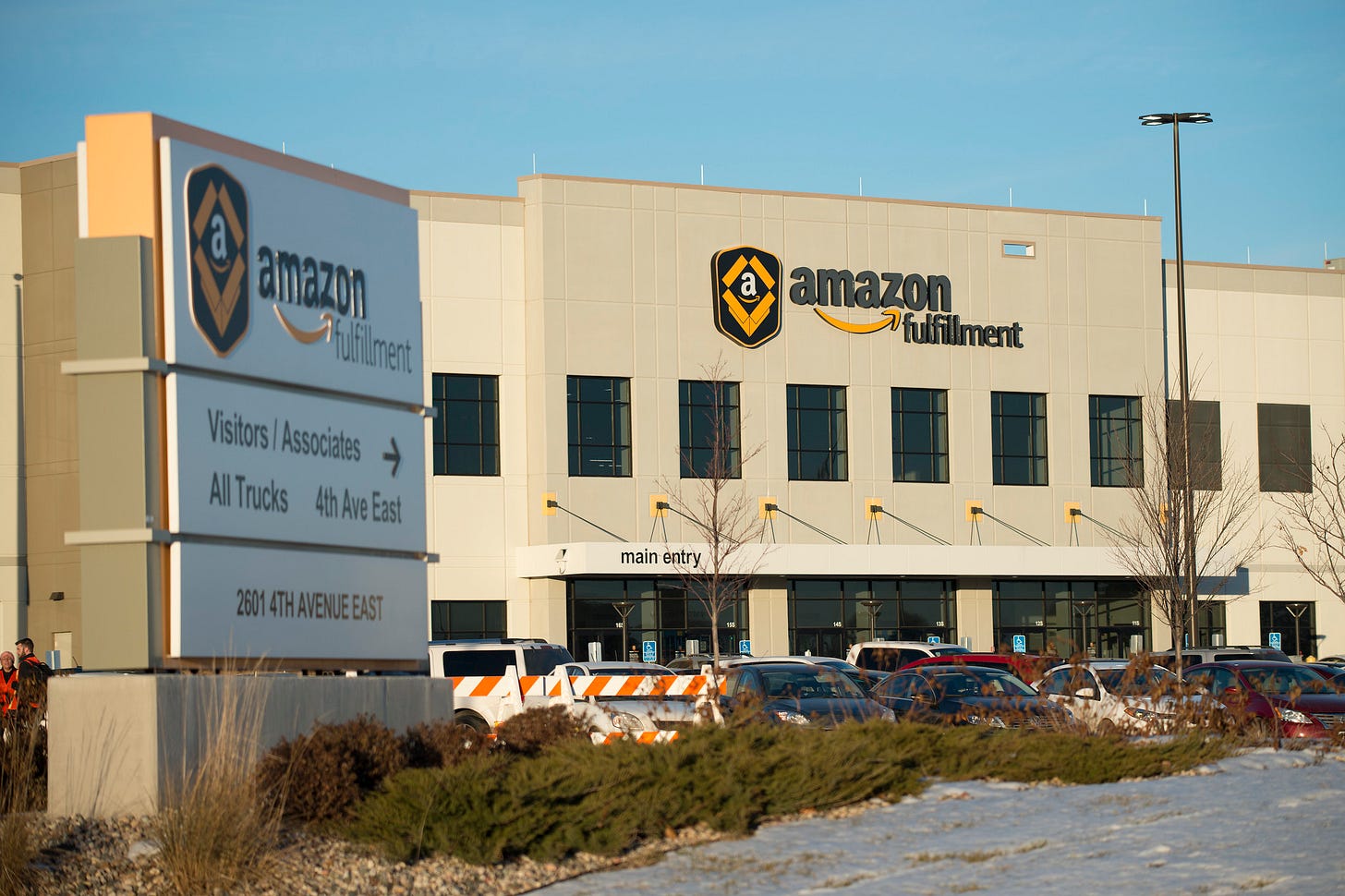
This is Boondoggle, the newsletter about corporations ripping off our states and cities. If you’re not currently a subscriber, please click the green button below to sign up. Thanks!
Early last year, Montgomery, New York, granted Amazon about $25 million in tax incentives for a new warehouse, joining the many other places that have collectively given Amazon billions of public dollars to expand its distribution network.
But these deals often harm communities in ways beyond the simple dollars and cents: In the case of Montgomery, it’s local workers — painters, to be specific — who were hurt by pliant politicians caving to Amazon’s power. What Montgomery-based painters experienced is a striking example of how local leaders refuse to adequately police the deals they make, caving to corporate interests over and over.
Here’s what happened: That $25 million given to Amazon came with some conditions, including a requirement to use local labor during construction of the warehouse. That requirement, though, was apparently too much for the developer that is overseeing the project.
The developer had previously received waivers from local labor requirements for work on the site’s fire sprinklers and storage tank, concrete, and steel. But it wanted cheaper paint too.
According to the waiver granted by the Montgomery economic development board, Amazon’s developer can go outside the local area for painters in order to save 20 percent on the bill. As New York State Senator James Skoufis said, the waiver is especially ludicrous considering that construction is already underway on the site, and has been for months, so there’s essentially no chance Amazon — one of the largest corporations in the world, mind you, that is reaping huge profits during the pandemic — would abandon it over a 20 percent higher paint bill.


It’s also worth reiterating that Amazon doesn’t choose these sites based on tax incentives or other giveaways: It goes where Amazon customers and their money are. Tweaking construction costs on the margins won’t change its behavior in any meaningful way.
Those construction dollars, though, can make a big difference for local laborers and small businesses. Requirements to use local labor on projects that receive public money are one of the levers local leaders have to ensure that at least some benefits from corporate giveaways directly redound to the community. After all, if a company is going to benefit from tens of millions of local dollars, seems the least it can do is ensure that jobs go to local workers, who are more likely to keep their wages in the community.
But that goes out the window if the corporations in question can simply ask for those requirements to be waived. This is an instance in which local leaders need to recognize they have power: As Skoufis said, there is no way Amazon was going to pull up stakes on an already-underway project over a slightly higher paint cost. Amazon had no leverage. And yet it received a waiver anyway.
To be honest, you can’t really blame Amazon’s developer for asking for waiver after waiver, since local officials keep saying yes.
The Montgomery, New York, economic development board is especially bad, so I’m not stunned it is throwing Amazon bones left and right. An investigation by the New York State senate into problems with local economic development offices literally used Montgomery as a case study. But allowing corporations to renegotiate their targets regarding labor is, sadly, more pervasive.
For example, Nathan Jensen and Calvin Thrall did a survey of corporate incentive deals in Texas and found that more than a quarter of them were “renegotiated” by local leaders and the corporations. “Most of these amended contracts were designed to reduce companies’ commitments to job creation,” Jensen and Thrall discovered. Texas is likely not an outlier in this regard.
Creating local job growth is one of the benefits that communities are supposed to experience because of corporate tax incentive arrangements. That job creation often doesn’t materialize, for a variety of reasons. But it especially won’t materialize if local leaders simply decree it doesn’t have to, while still letting corporations walk off with your money.
It may be too late for Montgomery’s painters to secure some work on an Amazon warehouse, but it’s never too late to push your own local leaders to do better when Amazon — or any other company — comes to town.
ONE MORE THING: Speaking of Amazon deals, something one can’t help but notice is that local reporting about them is often a bit lacking. Local news outlets — more out of time and expertise constraints than due to any kind of coziness with big business, I think — tend to portray these deals as all upside, not asking key questions about who will benefit or what the true costs are. So Arlene Martinez, communications guru at Good Jobs First, and I put together a primer for local reporters who are covering Amazon’s expansion.
You can give it a look here, and please share it with local reporters if Amazon comes to your town. They may need the help, especially on a tight deadline.
Thanks for reading this edition of Boondoggle. If you liked it, please take a moment to click the little heart under the headline or below. And forward it around to friends, family, or neighbors using the green buttons. Every click and share really helps.
If you don’t subscribe already and you’d like to sign up, just click below.
Finally, if you’d like to pick up a copy of my book, The Billionaire Boondoggle: How Our Politicians Let Corporations and Bigwigs Steal Our Money and Jobs, go here.
Thanks again!
— Pat Garofalo




You think Montgomery's bad? Here in Kingston the Ulster County IDA just approved a PILOT for luxury housing that will be financed on the public dime to the tune of 60.15%. And workers will be paid a "livable" wage for one person. That's great, if you're living in your parents' basement.